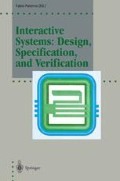Abstract
In this paper we explore a group of properties of interactive systems (by which we mean the whole system of computers, users and other features of the working environment) that have in common a notion interaction freedom. We shall argue that properties within this category are often discussed imprecisely. What we mean by interaction freedom here is the flexibility of an interactive system to switch between activities and the freedom of the user to choose options, and to be aware of his or her own progress. Our aim is to understand these ideas more precisely in terms of an interaction framework [6, 3] so that they can be used by cognitive modellers in understanding the consequences of such flexibility on learning or using a computer system, or by system designers in understanding how such properties may be built into an interactive system.
Access this chapter
Tax calculation will be finalised at checkout
Purchases are for personal use only
Preview
Unable to display preview. Download preview PDF.
References
P. Barnard and M. D. Harrison. Integrating cognitive and system models in human computer interaction. In A. G. Sutcliffe and L. A. Macauley, editors, People and Computers V. Cambridge University Press, 1989.
P. J. Barnard and M. D. Harrison. Towards a framework for modelling human computer interaction. In J. Gornostaev, editor, Proceedings International Conference on HCI, EWHCI’92, pages 189–196. Moscow:ICSTI, 1992.
A.E. Blandford, M.D. Harrison, and P.J. Barnard. Integrating user requirements and systems specification. In Computers, Communication and Usability: Design Issues, Research Methods and Integrated Services, pages 165–196. North Holland Studies in Telecommunication, 1993.
J. M. Carroll and C. Carrithers. Blocking learner errors in a training wheels system. Human Factors, 26:377–389, 1984.
A.J. Dix. Formal Methods for Interactive Systems. Academic Press, 1991.
M. D. Harrison and R J. Barnard. On defining requirements for interactions. In Proceedings of the IEEE International Workshop on Requirements Engineering, pages 50–54. IEEE, New York, 1993.
M. D. Harrison, C. R. Roast, and P. C. Wright. Complementary methods for the iterative design of interactive systems. In G. Salvendy and M.J. Smith, editors, Designing and Using Human-Computer Interfaces and Knowledge Based Systems, pages 651–658. Elsevier Scientific, 1989.
M.D. Harrison, G.D. Abowd, and A.J. Dix. Analysing display oriented interaction by means of system models. In Computers, Communication and Usability: Design Issues, Research and Methods for Integrated Services, pages 147–163. Elsevier, 1993.
C. A. R. Hoare. Communicating Sequential Processes. Prentice Hall International, 1985.
Editor information
Editors and Affiliations
Rights and permissions
Copyright information
© 1995 EUROGRAPHICS The European Association for Computer Graphics
About this paper
Cite this paper
Harrison, M.D., Blandford, A.E., Barnard, P.J. (1995). The Requirements Engineering of User Freedom. In: Paternó, F. (eds) Interactive Systems: Design, Specification, and Verification. Focus on Computer Graphics. Springer, Berlin, Heidelberg. https://doi.org/10.1007/978-3-642-87115-3_16
Download citation
DOI: https://doi.org/10.1007/978-3-642-87115-3_16
Publisher Name: Springer, Berlin, Heidelberg
Print ISBN: 978-3-642-87117-7
Online ISBN: 978-3-642-87115-3
eBook Packages: Springer Book Archive

